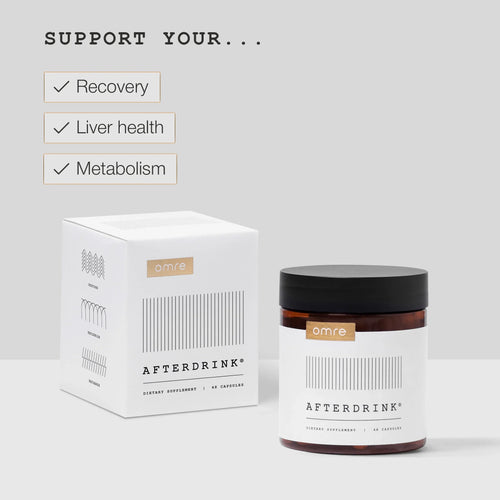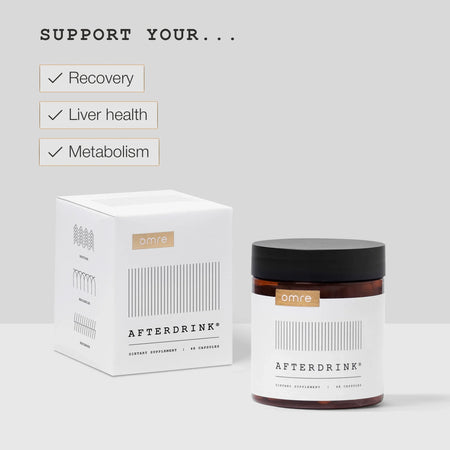Table of Contents
Will you feel better if you work out when you are hungover? and is it good for you?
These are common questions and ones that don't exactly have simple answers.
Studies have shown that people are more likely to work out from Thursday through to Sunday. This encapsulates the weekend which is when most of us drink more alcohol.
So although you may assume that working out after drinking is an unlikely pairing, it's actually more common than you'd think.
In this article, we're going to take a closer look at how alcohol affects your body before moving on to whether working out helps a hangover.
AFTERDRINK®
A supercharged antioxidant designed to support recovery, made from the very best, research-backed ingredients on the market.*
Causes of a hangover
Before we get into whether working out helps a hangover, we first need to go over how hangovers affect your body.
Ultimately, hangovers are caused by drinking too much alcohol, too quickly. You're only able to metabolize alcohol at a certain rate. This is usually around one standard drink per hour. But this number varies greatly between individuals and factors such as your age, weight, and gender all play a part.
Drinking faster than this means that your blood alcohol levels start to rise. This is where you start to feel the pleasurable effects of alcohol. It's also when the negative effects of drinking alcohol start:
Dehydration
Alcohol is a diuretic. This means it makes your kidneys flush out water. It does so by blocking a hormone called vasopressin which is responsible for water regulation. That's why drinking too much alcohol can cause dehydration.
Inflammation
When alcohol is metabolized in your liver, toxic by-products such as acetaldehyde are formed. In simple terms, these react with your cells causing inflammation.
Sleep disturbance
Alcohol blocks your brain from reaching the REM stage of sleep. This is the deepest stage of sleep and where dreams happen. Aside from this, it's important to have undisrupted REM sleep to have a fully rested mind.
As a consequence of the above-mentioned damaging effects of alcohol, you wake up with hangover symptoms which we are all familiar with.
With the science out the way, let's take a closer look at whether working out helps hangovers.
Does working out help with hangovers?
The main reason why you may find that working out helps hangovers is because of the release of "feel-good" hormones known as endorphins.
Endorphins are released by our pituitary glands and nerve fibers and reduce the perception of pain and increase the sensation of pleasure.
And this is why we generally feel better about ourselves after we work out.
But there are some downsides to working out hungover which we will cover next.
Risks of working out when hungover
While working out after a night of drinking might seem like the best way to make up for last night's debauchery, it might not actually be the best idea.
Let's face it, you're not going to be at your sharpest when hungover. You'll be dehydrated and your levels of tissue inflammation will be much higher than normal. That means your energy levels, focus and endurance are massively reduced.
Here are some of the ways in which working out when hungover can do more harm than good:
1) Working out exacerbates dehydration
We mentioned earlier that alcohol is a diuretic. Clearly, working out will exacerbate dehydration by making you sweat.
You can obviously counteract this by drinking more water. But by the time you've woken up with a hangover, your body has a significant water deficit that needs to be replaced over a longer period of time.
Downing a couple of liters of water before working out isn't going to solve the problem. And doing so will only make you feel bloated and uncomfortable.
2) Clumsiness or "Brain fog" increases the risk of injuries
We all know the feeling of waking up hungover and everything is working in slow motion. "Brain fog" and reduced mental alertness are real problems and studies have shown that cognitive function when hungover is significantly reduced.(1)
As a result, the risk of having accidents is naturally higher. Especially if you're working out hungover with heavy weights.
3) Muscle recovery is reduced
There's a good reason why top athletes don't drink before or soon after sporting events. It's well known that alcohol reduces muscle strength output and greatly increases recovery times.(2)
Ultimately, working out hungover is not going to have the same benefits for your athletic gains.
4) Added pressure on your heart
Ever felt that your heart is beating faster when hungover? It's because your resting heart rate is higher than usual after a big night out. There are several different reasons for it including dehydration and the effects of alcohol on your nervous system.(3)
Working out when hungover will only push your heart rate up further adding to the pressure on your body. With that said, it's unlikely to do any long-term damage. But it may not feel great while working out.
Although working out could potentially help a hangover by the release of endorphins, there are a few risks associated with it. That's why working out when hungover is probably best avoided. It adds unnecessary pressure on your body and there's an increased risk of injury.
AFTERDRINK®
A supercharged antioxidant designed to support recovery, made from the very best, research-backed ingredients on the market.*
Can you "sweat out" a hangover?
Some people work out to get rid of their hangover symptoms. You may have heard of the phrase "sweating out toxins" when hungover.
Unfortunately, it doesn't work. That's because there are no toxins to "sweat out".
By the time you've woken up with a hangover, the damage from alcohol has been done. As we mentioned before, dehydration, inflammation, and a lack of good quality sleep are the main causes of a hangover. Working out is not going to counteract or replenish any of these.
In summary, there is no scientific basis for "sweating out toxins or alcohol" when hungover.
Anything else to consider?
Hangovers are a sign from your body that you've been drinking too much alcohol for your liver to handle. Working out to cure a hangover is the wrong approach and could be detrimental rather than beneficial.
When it comes to hangovers, prevention is key. Aside from drinking less alcohol, eating before going out, and making sure you drink plenty of water are essential.
Does working out help a hangover? - Final verdict
That brings us to the end of our look into whether working out helps a hangover.
We've walked you through all the ways in which alcohol causes hangovers as well as the downsides to working out after drinking alcohol.
There are quite a few negatives to consider and working out hungover can be detrimental instead of beneficial for your body.
Alcohol and hangover put a lot of pressure on your body. Therefore, giving your body a chance to recover before working out is probably the best way forward.





